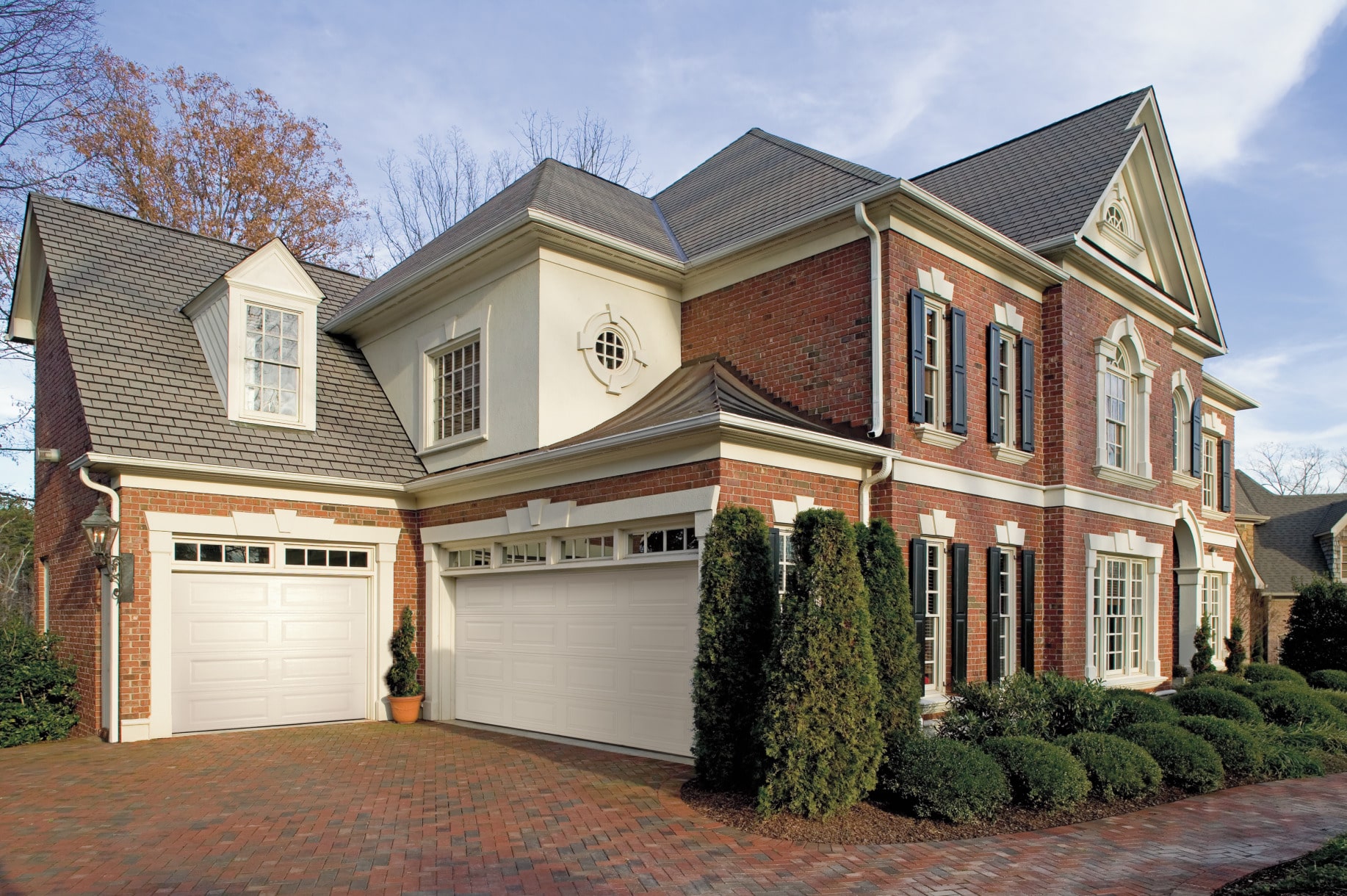That sinking feeling. You hit the button, expecting your garage door’s familiar rumble and descent, but it just sits there, mocking your efforts. Or maybe it starts to close, then jerks back open like it’s seen a ghost. A garage door won’t close for any number of reasons, from the obvious to the downright sneaky, leaving your home vulnerable and you feeling frustrated.
But don’t surrender to that wave of panic just yet! Take a deep breath before resigning yourself to a hefty repair bill or barricading the driveway with your car. Many times, the reason your garage door won’t close is surprisingly simple to diagnose and fix. This post will guide you through some of the most common culprits and empower you with DIY solutions to get your garage door back on track.
Why your garage door won’t close
There are several reasons why your garage door might be giving you the cold shoulder. Let’s break down some of the most common culprits, starting with those pesky safety sensors.
1. Sensor Issues
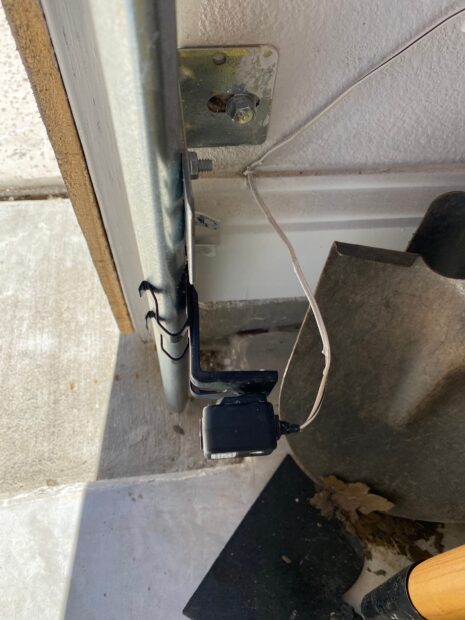
Those little eyes at the bottom of your garage door tracks aren’t just for show. Safety sensors are designed to prevent the door from closing if something (or someone!) is in the way. If your door starts to close and then immediately reverses, there’s a good chance your sensors are the issue.
Obstructions: dirt, debris, misalignment
The most common sensor problem is a simple obstruction. Check for anything blocking the path between the sensors – leaves, dirt, cobwebs, and even a child’s toy can be enough to disrupt the signal.
Also, ensure the sensors are correctly aligned. They should be facing each other directly. If they’re knocked out of alignment, even slightly, they won’t be able to “see” each other, and the door won’t close. You can usually adjust them by hand or with a simple wrench.
Wiring problems: loose connections, damage
Sometimes, the problem isn’t with the sensors but the wires connecting them. Check for any loose connections or signs of damage to the wiring. If you spot a loose wire, carefully reconnect it. If the wiring is damaged, you’ll likely need to replace it.
Sensor failure: testing and replacement
In some cases, the sensors themselves may simply fail. Try passing a broom handle or similar object through the beam to test them. The garage door opener lights should flash, indicating the sensors are working. If not, it might be time for a replacement. Fortunately, sensor replacements are relatively inexpensive and easy to find at most home improvement stores.
2. Track and Roller Problems
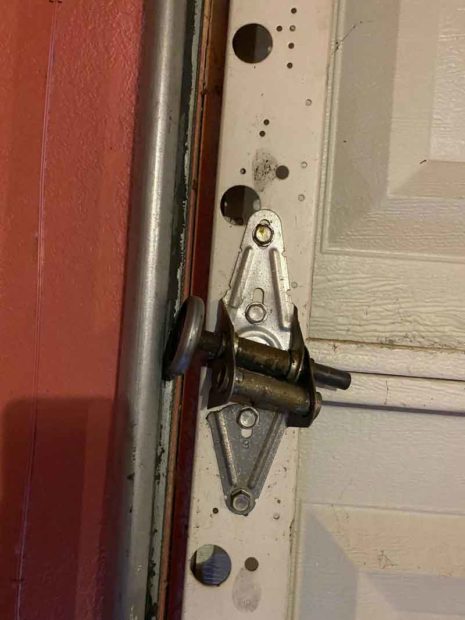
Believe it or not, your garage door resembles a train. It needs a clear track to run smoothly! If something impedes the rollers that glide along the tracks, your door might refuse to budge.
Obstructions: debris, dents, bends
Just like with your sensors, even small obstructions can cause big problems. Scrutinize the tracks for any debris, dents, or bends hindering the rollers. Clear away any debris and gently hammer out any minor dents. If you find a significant bend in the track, you may need to replace that section.
Lubrication: importance and methods
Those rollers need a little love to keep things moving smoothly. Regular lubrication is crucial for preventing friction and wear and tear. You can use a garage door lubricant or even a silicone-based spray. Apply it to the tracks and rollers, then operate the door a few times to distribute the lubricant evenly.
Roller damage: signs and replacement
Over time, the rollers themselves can wear down or become damaged. Listen for any squeaking or grinding noises when the door operates, which could indicate roller problems. If you spot any cracks or flat spots on the rollers, it’s time for a replacement. You can usually find replacement rollers at your local hardware store, and replacing them is a relatively straightforward DIY project.
3. Spring Issues
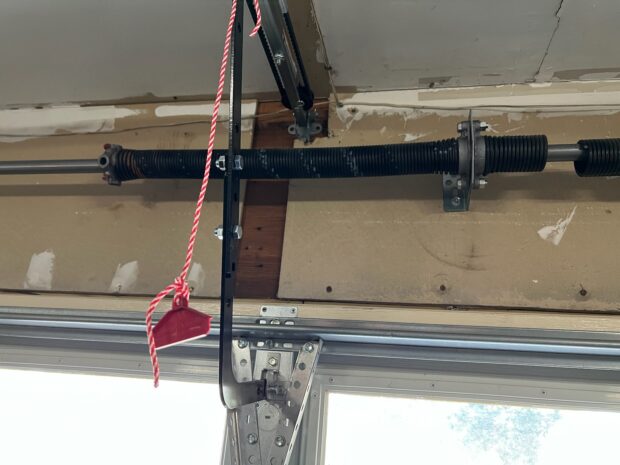
Those powerful springs above your garage door are the muscle behind the operation. They counterbalance the door’s weight, making it easy to lift and close. There are two main types: torsion springs (above the door) and extension springs (along the horizontal tracks).
Spring tension: how to assess
If your door feels unusually heavy or seems to struggle, the springs may have lost tension. Assessing this yourself can be tricky, as springs are under a lot of pressure. Never attempt to adjust or repair springs yourself. This job is best for professionals, as improper handling can lead to serious injury.
Broken springs: dangers and professional replacement
A broken spring is a common reason a garage door refuses to close. When spring breaks, you’ll often hear a loud bang. Again, never attempt to replace a broken spring yourself. This is extremely dangerous and should only be handled by a qualified technician.
4. Lock and Release Mechanism
Most garage doors have a manual release mechanism. This cord, usually red, hangs down from the opener. It allows you to disconnect the door from the opener in case of a power outage or malfunction.
Accidental disengagement
This release cord can sometimes be accidentally pulled, disconnecting the door from the opener. If your door seems to operate manually but not with the remote or wall button, check if the release cord is engaged. Simply pull the cord towards the door to reconnect it.
Lock mechanism failure
Some garage doors also have a locking mechanism that prevents forced entry. If this mechanism fails, the door may not close properly. Inspect the lock for any signs of damage or obstruction. If you suspect a problem, contact a professional for repair or replacement.
5. Opener Problems
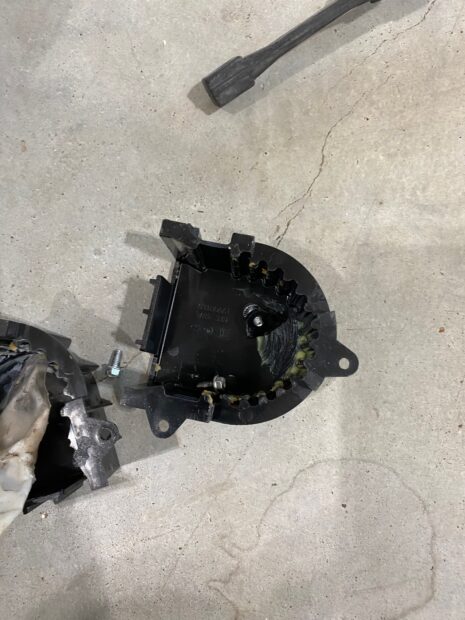
The garage door opener itself can also be the source of your woes. There are several types of openers – chain drive, belt drive, and screw drive – each with its potential issues.
Limit switch adjustment
The limit switch controls how far the door travels when opening and closing. If it’s not set correctly, the door may not close completely. You can usually find the limit switch adjustment screws on the opener motor. Consult your owner’s manual for specific instructions on how to adjust them. Be careful when adjusting the limit switch, as incorrect settings can cause the door to open or close too far, potentially causing damage.
Motor issues: troubleshooting and repair
If you hear the opener running but the door isn’t moving, there may be a problem with the motor. First, check the power supply to the opener. If that’s not the issue, the motor itself may be faulty. Troubleshooting motor problems can be complex, so it’s often best to consult a professional.
Remote control problems: batteries, programming
Sometimes, the problem is as simple as a dead battery in your remote control. Try replacing the batteries and see if that solves the issue. If not, the remote may need to be reprogrammed. Again, refer to your owner’s manual for instructions on programming your remote.
Troubleshooting garage door won’t stay closed
Now that you understand the potential causes better let’s get hands-on and try to solve the problem. This step-by-step guide will walk you through troubleshooting your garage door. Remember, safety comes first! Always disconnect the power to the opener before performing any maintenance or repairs.
Step 1: Visual Inspection
Begin by carefully examining all the visible components of your garage door system. Look for any obvious signs of damage, obstruction, or misalignment. Pay close attention to the tracks, rollers, sensors, springs, and opener.
Step 2: Test the Safety Sensors
As mentioned earlier, these are often the culprits. Test them by passing an object through the beam and observing the opener lights. If they don’t flash, check for obstructions, alignment issues, or wiring problems.
Step 3: Check the Tracks and Rollers
Inspect the tracks for any debris, dents, or bends. Clear any obstructions and lubricate the tracks and rollers with a suitable lubricant.
Step 4. Examine the Springs (Without Touching!)
Look for any signs of damage or breakage in the springs. Do not attempt to adjust or repair the springs yourself. If you suspect a spring issue, call a professional.
Step 5: Troubleshoot the Opener
Check the power supply to the opener and try operating the door using the wall button and remote. If the opener is running but the door isn’t moving, there may be a motor issue. If the remote isn’t working, replace the batteries or try reprogramming it.
Simple DIY Fixes
Many common garage door problems can be resolved with some simple DIY fixes. Here are a few things you can try:
- Cleaning the sensors: Wipe down the sensor lenses with a soft, clean cloth to ensure they are free of dirt, dust, and cobwebs.
- Lubricating the tracks and rollers: Apply a garage door lubricant or silicone spray to the tracks and rollers. Operate the door a few times to distribute the lubricant evenly.
- Adjusting the limit switch (with caution): If the door isn’t opening or closing completely, you may need to adjust the limit switch. Consult your owner’s manual for specific instructions. Remember to proceed with caution, as incorrect adjustments can cause damage.
- Reprogramming the remote: If your remote isn’t working, try replacing the batteries. If that doesn’t solve the issue, you may need to reprogram the remote. Refer to your owner’s manual for instructions.
Need expert help on your garage door won’t stay closed problem?
While some garage door issues can be tackled with DIY solutions, it’s important to recognize when professional help is necessary.
Safety first
Garage door springs are under immense tension and can cause serious injury if handled incorrectly. Always leave spring repairs and complex adjustments to qualified technicians.
Signs you need a pro
- Broken springs
- Significant track damage
- Opener malfunction
- Persistent issues despite troubleshooting
Doorvana: Your garage door solution
When your garage door needs expert attention, trust Doorvana. Our skilled technicians provide reliable repairs, replacements, and maintenance for all garage doors and openers. Contact us today for a free estimate, and let us get your door back on track!
Conclusion
A garage door that won’t stay closed is more than just an inconvenience; it’s a potential security risk and an invitation for unwanted pests and weather damage. You can often resolve the issue by understanding the common causes and following our troubleshooting guide. However, remember that safety is paramount. Don’t hesitate to call in the professionals at Doorvana when dealing with complex repairs or broken springs. With a little knowledge and preventative maintenance, you can ensure your garage door stays closed and keeps your home secure. Contact Doorvana today for a free estimate and let our experts handle all your garage door needs.
FAQs about garage door won’t close
My garage door starts to close and then immediately reverses. What’s going on?
This is a classic sign of a problem with your garage door’s safety sensors. These sensors are located near the ground on either side of the door. They project an invisible beam, and if anything interrupts that beam, the door reverses to prevent injuries or damage. Here’s what to check:
My garage door is making a grinding noise and struggles to close. What could be the problem?
That grinding noise is a telltale sign that something’s not right with your garage door’s moving parts. It likely means your rollers are struggling to glide smoothly along the tracks.
My garage door feels very heavy and won’t close all the way. Could it be the springs?
Yes, it’s possible. Garage door springs counterbalance the door’s weight. If they lose tension or break, the door will become heavy and difficult to operate.
My garage door closes manually but not with the remote or wall button. What should I do?
If your garage door is playing favorites and only responds to manual commands, the issue likely lies with the opener system itself or how it communicates with the door.
I’ve tried everything, but my garage door still won’t close. What are my next steps?
If you’ve exhausted basic troubleshooting steps and your garage door still refuses to cooperate, it’s time to call in the experts.

